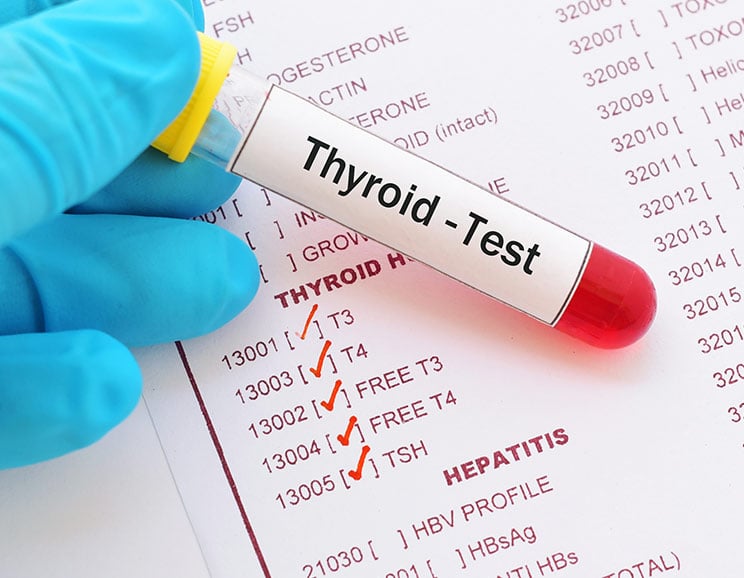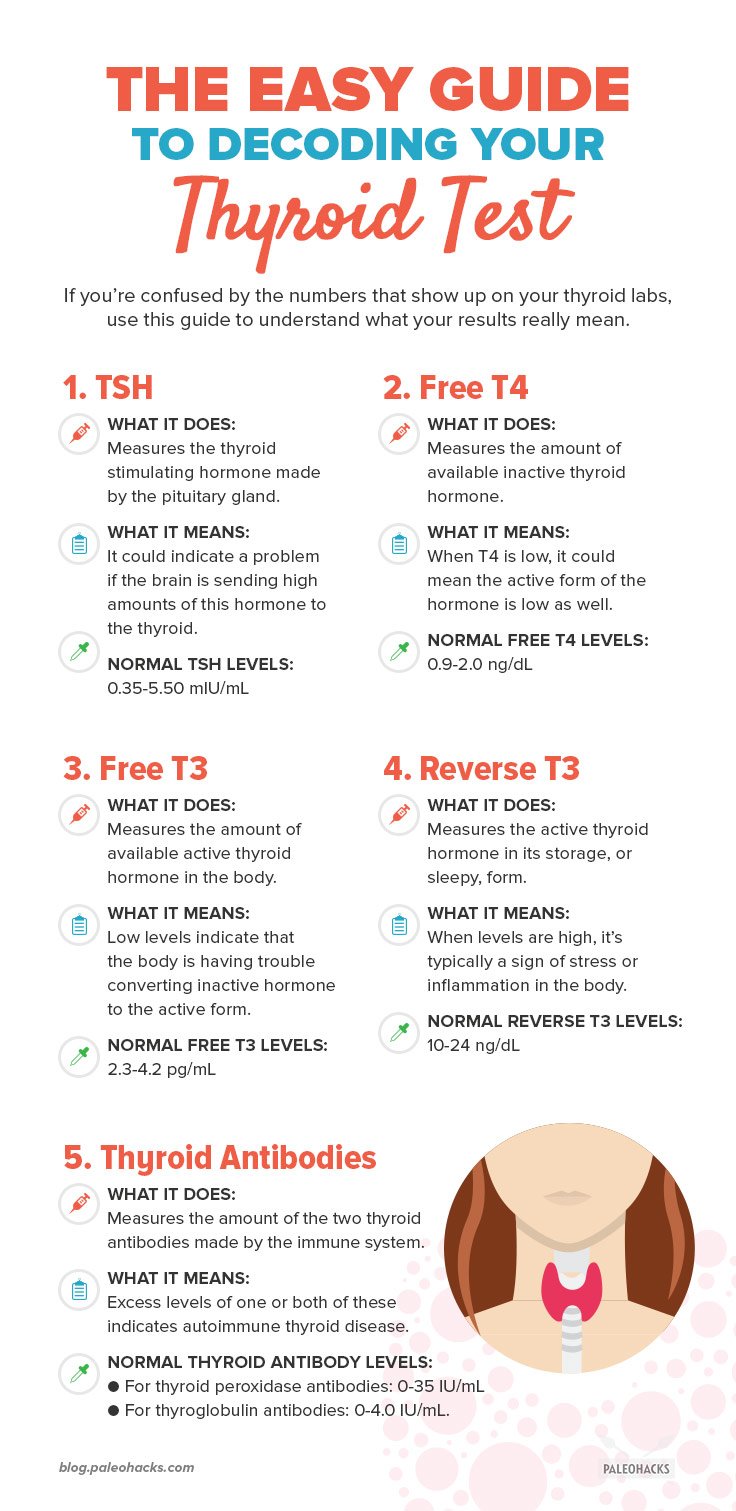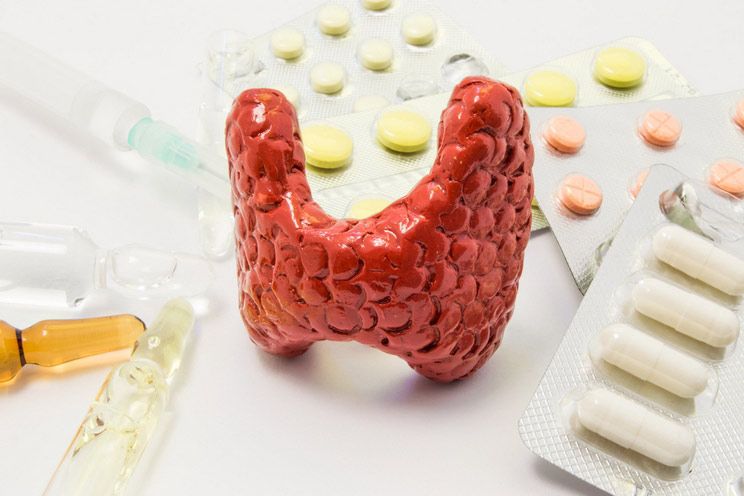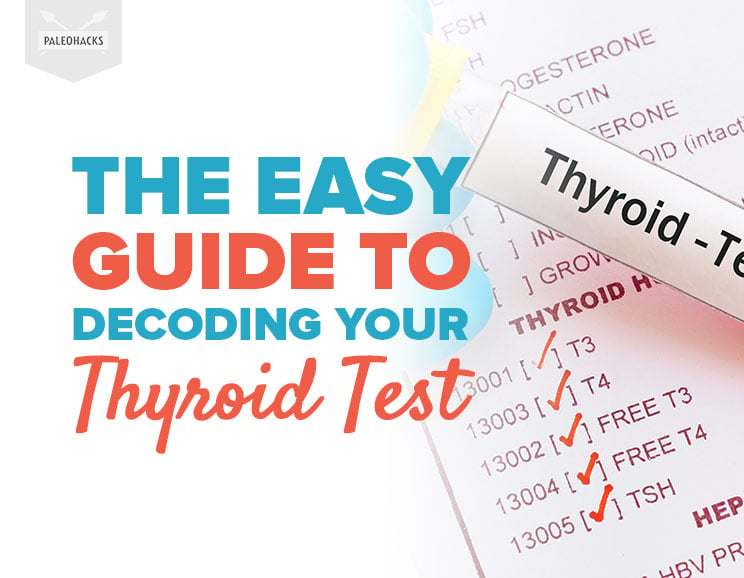If you’re confused by the types of hormones that show up on your thyroid labs, use this guide to understand what your results mean for your health.
Thyroid problems are complex, but it’s not impossible to read and understand your lab results. In fact, it can make all the difference in managing your thyroid disease!
More than 30 million Americans suffer from some kind of thyroid disorder, and seven out of eight are women. Because symptoms can overlap with numerous other conditions that can also affect women, like PMS or menopause, it can often go undiagnosed for years.
Struggling to lose weight? Unable to focus? Chances are, your hormones are out of whack.
Grab Our FREE Guide To Fixing Your Hormones By Clicking Here!
When you understand the basics of thyroid lab testing and know which tests to ask for, you won’t be at the mercy of a practitioner who might still use outdated methods of monitoring.
The Quick Basics of Thyroid Hormones

The thyroid produces two hormones that work together to regulate energy, metabolism, body temperature and fertility. (1)
T4 is the inactive form of thyroid hormone, and is produced in higher amounts. When the body needs active hormone, T4 gets converted into T3, the active form. Depending on thyroid disorders, genetics, and other conditions, some people will struggle with producing enough T4, with converting T4 into T3, or with the brain telling the thyroid to produce any hormones at all.
Without a properly functioning thyroid that produces the right amount of both inactive and active hormones, you will likely feel a plethora of symptoms, including: (2)
- Fatigue
- Mental sluggishness
- Cold, especially in hands and feet
- Sleep problems
- Dry and brittle hair, skin, and nails
- Bleeding gums
- Low mood
- Decreased sex drive
5 Common Thyroid Lab Tests

Even if you haven’t been diagnosed with thyroid disease, it’s important to get your thyroid checked regularly – especially if you’re a woman. Hashimoto’s thyroiditis is the most common autoimmune disorder, and is frequently diagnosed in women who are between the ages of 30 and 50. (3, 4, 5) Yet it can take years to develop into a full-blown condition, and preventive care could go a long way.
While you can’t cure a thyroid disease once you have it, there’s plenty of speculation that autoimmune disease can be prevented by living an anti-inflammatory lifestyle and protecting gut health.
In order to advocate for your thyroid health, you’ll need to understand the five basic lab tests used to monitor it.
1. TSH
This test is commonly run to assess thyroid wellness, and in many cases, this might be the only test that your doctor uses to determine if your thyroid is working well or not. Yet TSH, which stands for thyroid stimulating hormone, is not even a thyroid hormone in the first place. It is a hormone made by the pituitary gland in the brain that tells the thyroid when it needs to make more.
The assumption is that if the brain is having to yell at the thyroid by sending higher and higher amounts of this hormone, it may be indicative of a thyroid problem. The answer is almost always prescribed medication. On the other hand, if the TSH number is normal, then the assumption is that the thyroid is doing its job and there is no reason to look any closer.
Unfortunately, when this test is used as the only gauge for thyroid wellness, many underlying problems can be missed. Even if TSH is “normal,” thyroid antibodies could be present, or your levels of T4 or T3 could be low. This test is commonly run to assess thyroid wellness, and in many cases, this might be the only test that your doctor uses to determine if your thyroid is working well or not.
Normal TSH levels are 0.35-5.50 mIU/mL. However, you can still feel extreme symptoms of hypothyroidism when you are well within this normal range. While this is one lab test can provide a potential snapshot of your thyroid, it can sometimes force an incorrect conclusion and is rarely optimal when used on its own.
Thyroid problems do not happen overnight, and in many cases take months or years to develop. Unless you’re regularly getting all the thyroid labs done before you have symptoms, you wouldn’t notice this progression on paper. By the time TSH has gone out of range, chances are that the other thyroid labs looked off long before that. It’s time to change the way that we assess thyroid health.
2. Free T4
While T4 is the inactive form of thyroid hormone, it is also the primary form. Optimally, the T4 stores available will always match demand and can be effortlessly converted into the active form as needed.
But the thyroid doesn’t always work optimally and can easily succumb to disturbances in this process. Sometimes doctors will test “Total T4,” which measures the total amount of T4 in your body. This is an inaccurate perception, however, since not all T4 is available for conversion. Free T4, also known as thyroxine, is a measurement of the free, or available, T4 in the body, which more closely reflects the actual levels your body has to work with. Free T4, also known as thyroxine, is a measurement of the free, or available, T4 in the body, which more closely reflects the actual levels your body has to work with.
When free T4 levels are low, it often indicates that free T3 is also low. In response, doctors often prescribe synthetic T4 to give these levels a bump.
Normal free T4 levels should fall between 0.9-2.0 ng/dL. Free T4 is done via a fasting blood test first thing in the morning, and if you already take thyroid medication, should be done before medication, coffee, or anything but water.
3. Free T3
Similar to free T4, free T3 is the amount of available T3 circulating through the body. If free T4 levels are optimal but free T3 is low, it can indicate that the body is having trouble making the conversion from inactive to active, or that too much T4 is being converted into a storage form instead of the active form. This is why looking at T4 alone isn’t the best way to assess total thyroid function.
Normal free T3 levels used to be 1.4-4.2 pg/mL but were recently narrowed to 2.3-4.2 or 2.3-3.8 pg/mL, depending on which lab you consult. When free T3 levels are low, sometimes synthetic T3 is prescribed in addition to T4, or a combination T3/T4 medication is used. Similar to free T4, free T3 is the amount of available T3 circulating through the body.
Some patients respond well to synthetic medication, whereas others might have no tissue response at all. Finding the right medication, and its proper dose, can sometimes feel like searching for a needle in a haystack. This is why the full range of thyroid testing is vital, since it can shorten the time to finding the path back to balance.

4. Reverse T3
The test least often run by doctors to assess thyroid health, reverse T3 is the opposite of T3. Instead of being the active form of thyroid hormone, it is the storage form, sometimes called the sleepy form. When T4 is converted into reverse T3, symptoms of hypothyroidism will flare even if free T3 and free T4 levels are optimal. The test least often run by doctors to assess thyroid health, reverse T3 is the opposite of T3.
When reverse T3 is high, it’s typically a sign of stress or inflammation in the body, since it is typically produced as a way of saving the body energy. If you have higher than normal levels of reverse T3, it’s essential to take a big picture view of your overall health and consider food allergies, stress, digestive problems, or any other underlying disease or condition.
Normal levels of reverse T3 are considered to be 10-24 ng/dL, but some practitioners will consider the top end of the range to be a sign that excess conversion is taking place.
5. Thyroid Antibodies
There are two thyroid antibodies: thyroglobulin antibody and thyroid peroxidase antibody. These are made by the immune system to attack the thyroid when it has become sensitized to the gland for one reason or another.
Excess levels of one or both of these indicate autoimmune thyroid disease. While thyroid disease cannot be cured, it’s possible to get the body into a state of remission. This occurs when antibody levels return to a normal range and the immune system ceases its attack on the gland.
Normal levels for thyroid peroxidase antibodies are considered to be 0-35 IU/mL. Normal levels for thyroglobulin antibodies are considered to be 0-4.0 IU/mL.
How to Advocate for Yourself When You Have Thyroid Problems

Just because you understand what your labs mean doesn’t mean you’re suddenly a doctor, but you know that! Simply knowing how to read your labs you can help ensure that the right ones are being run, and can help you understand what your thyroid is doing without having to wait for a doctor to explain it to you.
However, when it comes to thyroid labs and adjusting medications in response, this is where you need a practitioner who you can communicate with easily. There are several thyroid medications available and the specific combination you’re on, along with dosing changes, can create a nearly endless amount of possibilities.
While lab tests are one way of gauging your thyroid wellness, how you are feeling is another vital component. If, for example, you’re hovering near the high end of free T3 but on the low end of free T4, yet you have never felt better, it’s important to let your doctor know. In cases where your thyroid levels are still normal enough, it might not warrant a dosage change.
If, however, you’re smack in the normal range but feeling exhausted or plagued by other thyroid symptoms, it could be that one or more medications you’re on are not working. It could also mean that your reverse T3 is high, which is another reason to understand the less common tests that can be run to assess your thyroid status.
If your communication to your practitioner regarding your symptoms is met with responses that prioritize your lab test results above how you are feeling, it might be time to seek another practitioner who will take a look at the bigger picture.
Thyroid health is a complex issue, but is far from being the only slice of the pie that can be problematic. Try finding a functional medicine doctor or integrative MD who is versed in how the thyroid can influence nearly every other aspect of the body’s overall health.
(Read This Next: The Ultimate Guide To Thyroid Health)



 7 Easy Stretches to Erase Foot Pain
7 Easy Stretches to Erase Foot Pain









Show Comments